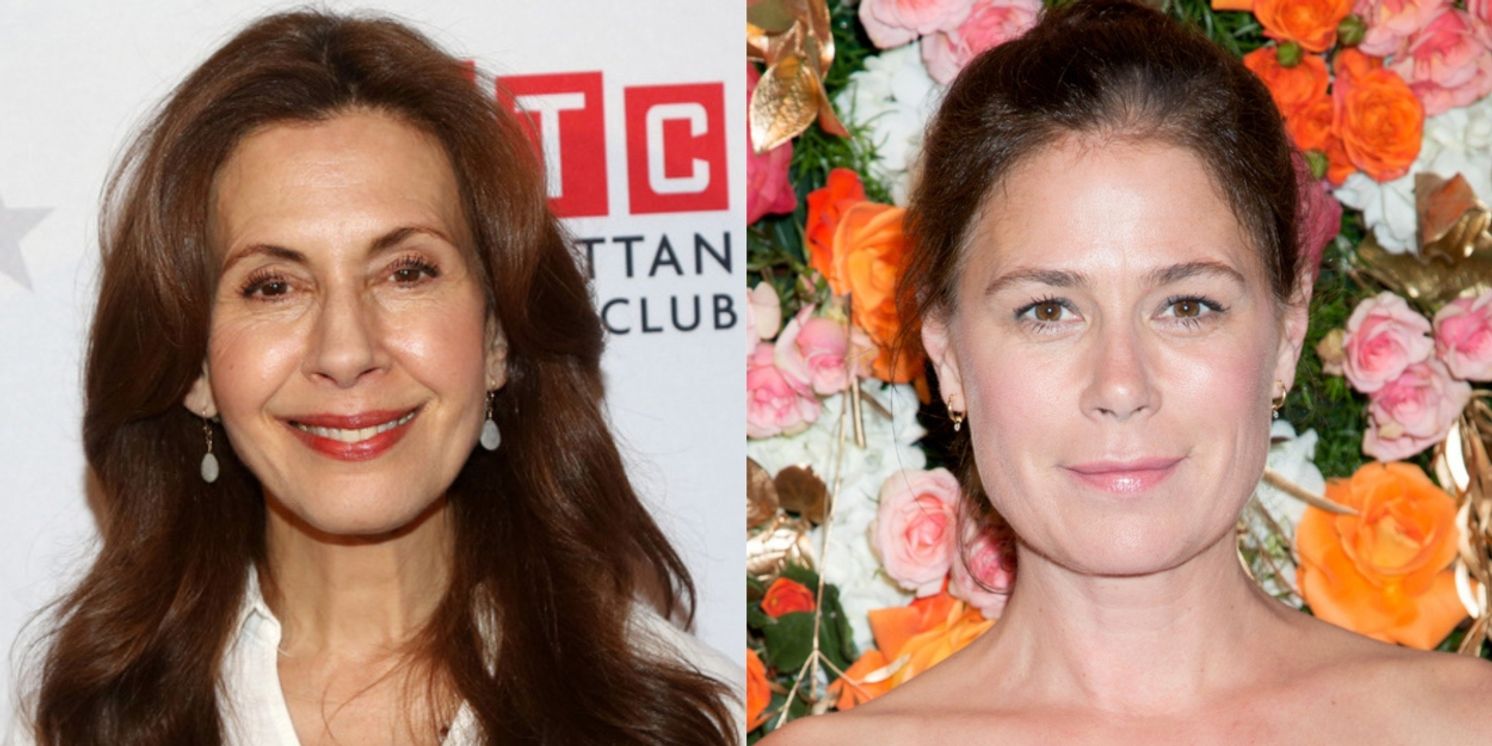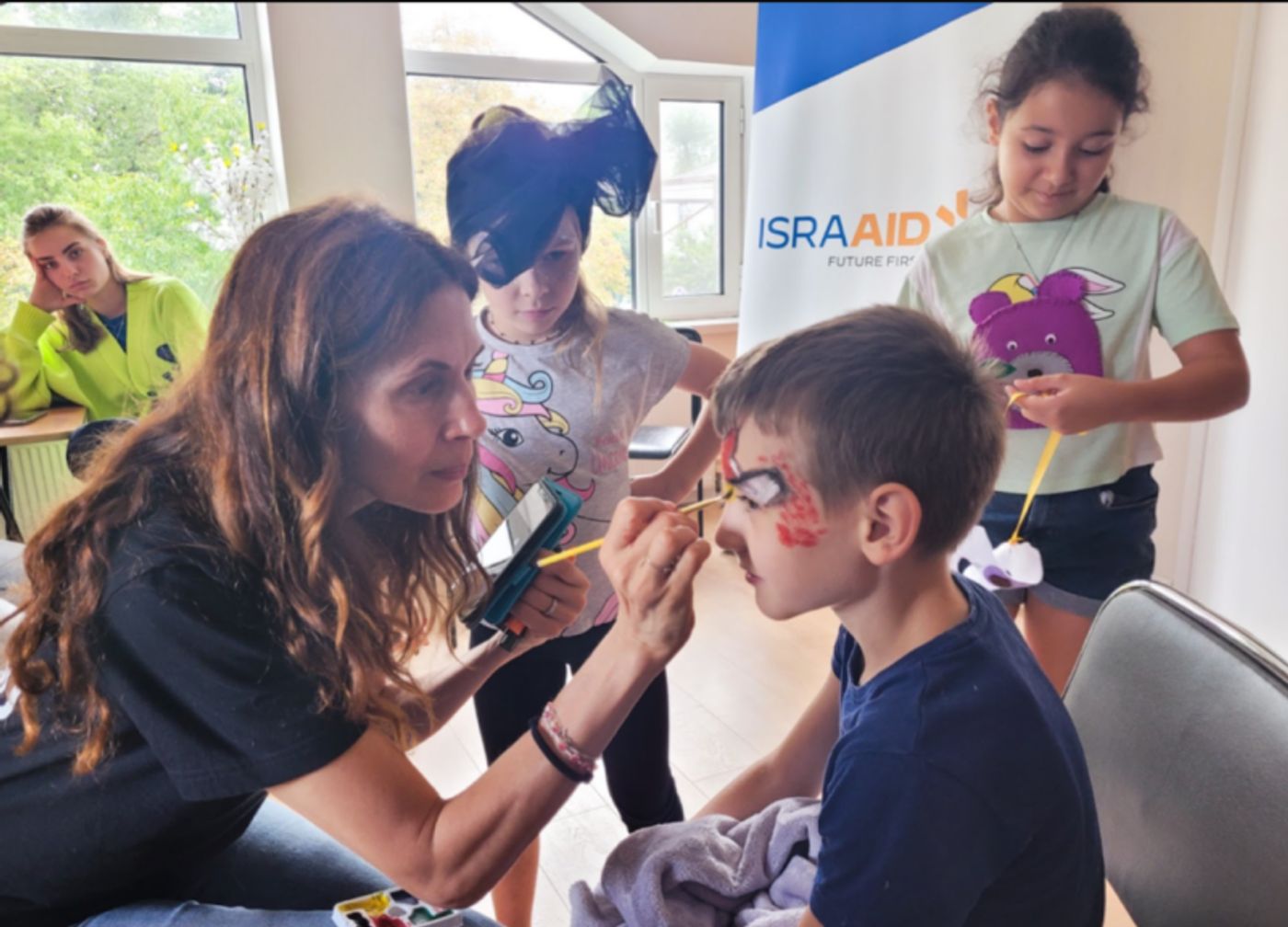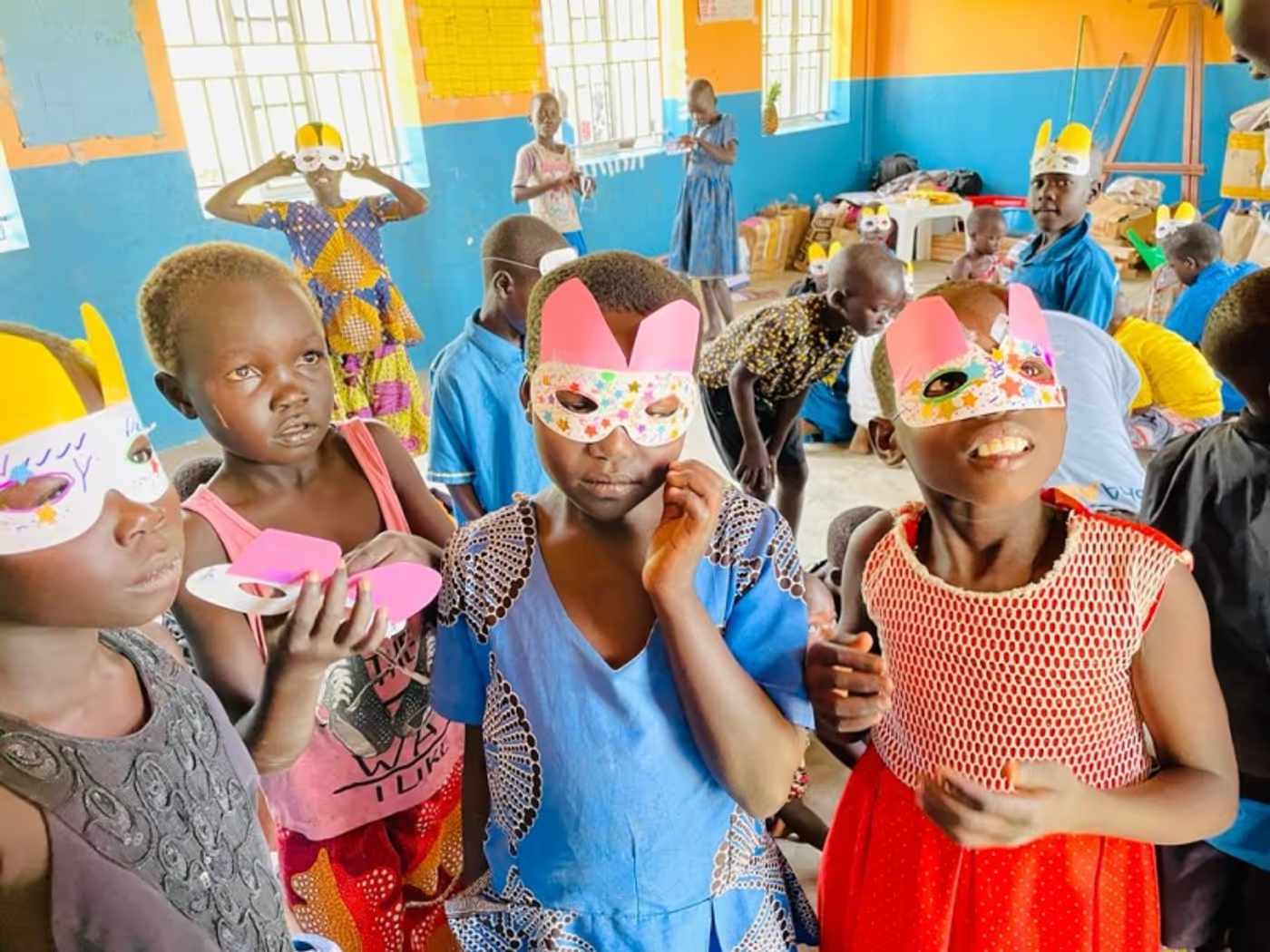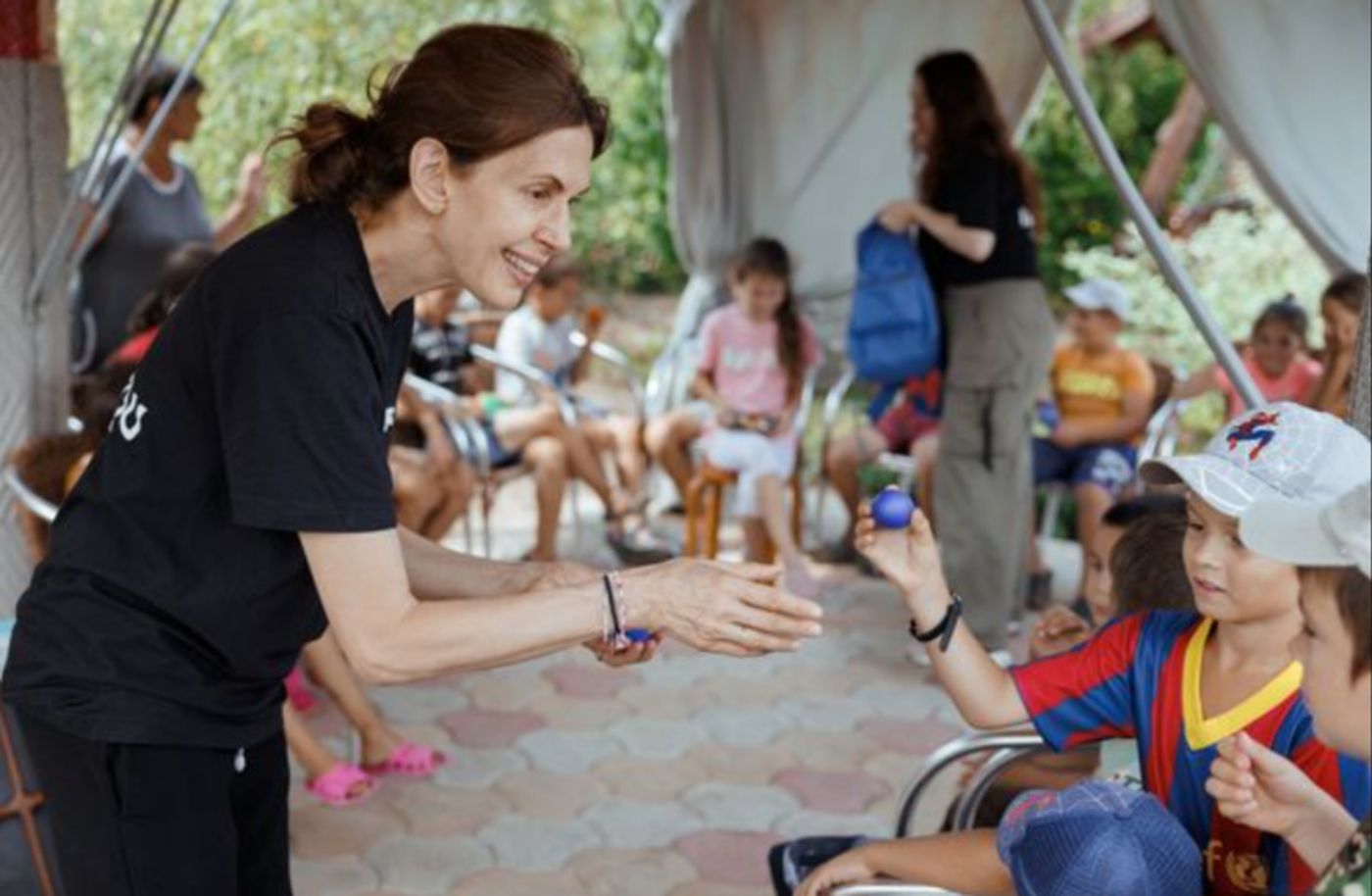Interview: Jessica Hecht & Maura Tierney Talk the campfire project and Using the Arts to Promote Healing In Refugee Communities
the campfire project empowers refugees to step into the spotlight, explore their creativity and refocus on their humanity.

In 2017, Tony-nominated actor Jessica Hecht and producer Jenny Gertsen, founded the campfire project, a program that travels to refugee spaces to impart arts-based wellness to displaced communities around the globe.
Using programming developed by creative artists and therapists trained in using the arts for achieving therapeutic objectives, the campfire project empowers refugees to step into the spotlight, explore their creativity and refocus on their humanity.
Several years and six trips to international refugee communities later, the group has successfully run workshops in locations such as Moldova, Greece, and currently, Uganda, where the team, led by Hecht and longtime member Maura Tierney, are leading workshops and therapy groups, as well as providing supplies to individuals living in these spaces.

With a growing team, the group faciliatates communication via practitioners who speak the languages of the various regions, and uses various forms of artistic impression including acting, music, arts and crafts, clowning, and stilt-walking to help those under their instruction to build community and overcome trauma. In 2018, the troupe planned and executed an Arabic-language production of Shakespeare's The Tempest to a promote a more compassionate understanding of both the text and the life of residents in the camp.
The exchange of mediums, however, is a two-way street with the group folding the indigenous artistic traditions of these communities into their pedagogy, learning just as much from their students as they teach.
We had an opportunity to chat with Ms. Hecht and Ms. Tierney about the current program in Uganda, their longstanding relationship with Broadway Cares/Equity Fights AIDS, and the future of the organization. Find out more about the campfire project in our interview below:
.png?format=auto&width=1400)
Ms. Hecht, what inspired you and your co-founder, Jenny Gersten, to start the campfire project?
Jessica: What inspired me to start the campfire project was really the experience I had doing Fiddler on the Roof. I was very preoccupied, as we all were at that moment, with the media onslaught of images and stories about the Syrian Civil War...Fiddler On the Roof is a very, for Jewish people, personal story of flight. We were doing bake sales backstage to help different small NGOs that I had been reading about. My dresser and I started doing these bake sales to help these little NGOs all over the world that had no funding. So we would send them money from bake sales we did every week...Then one day my dear cousin, a Holocaust survivor, he loves the theatre and he told me a story about Sholem Aleichem after he came to Fiddler. He said, "I did a play by Sholem Aleichem." I said, "Oh my God, where did you do that?" Because he was an economist. He said, "In the DP camp when I was waiting for asylum after the war." The details of his time as a child during the Holocaust were horrifying. He lost his parents. But he had this joy telling me about being in an a Sholem Aleichem play in the DP camp and getting chosen for a really good part when he was eight years old. And it just sat with me, this kind of idea that someone could literally, 80 years later, consider an experience like that transformative.
At that same time, I started hearing about people that were doing plays for refugees in different camps, and I inquired about how I could possibly do something because I knew some actors that were part of the Arabic community. I started thinking, I've taught acting for many years, and I've taught with children in different places. I thought, "Oh my gosh, we could bring these teaching artists and actors and do a play with the residents, not put it on for them per se, but do it with them." And it was just like throwing a little stone, not in an ocean, but in a tiny pond, and all these fish came. That's like my analogy for all the actors that replied to me and said, "I know someone who speaks Arabic," and "I'm a teaching artist. I'd love to come."

How did Broadway Cares/Equity Fights AIDS play a pivotal role in the development of this initiative?
Jessica: Mr dear friend, Mark Ruffalo, is an amazing activist. He had a lawyer friend who knows about refugee camps and was the legal counsel for a beautiful NGO and a refugee camp in Greece. Mark put me in touch with him and he said, "Tell me what you want to do.I think you can come to the camp where my NGO is." Then he said, "You have to go on a fact-finding mission first and see if it's the right environment." I didn't know how I would get the money, but I knew [BC/EFA Director] Tom Viola, who was very present at our Fiddler on the Roof days, and was always so open-hearted and appreciative of our bake sales, so I went to his office with my friend Jenny Gersten. He heard what we wanted to do, and he went upstairs to Mary Mitchell Campbell, and he knocked on her door and he brought her down because she runs this organization called A Step in India, which does amazing advocacy for young women in India. They came downstairs and she told us how she did her work, and I told them what I hoped to do in Greece at any camp we could get access to. And Mary said, "Oh, I'll go with you and see if we can figure out something there." Tom gave us our seed money for a team of six to go, including the director, Arin Arbus and Jenny, myself and Mary Mitchell. And it was a truly, truly transformative experience to realize you could do something like this.
Ever since then, I really credit Tom with just making something that was really seemingly so wildly difficult, completely manageable. Since then, he has at least funded half of our money, at least, if not more, for every trip we've gone on and has been so supportive. The idea that he would just listen and have a kind of belief in us was I think, in many ways, what has enabled us and many, many, many organizations to move forward with his blessing.

In your experience, what are the observable benefits of arts programming on individuals in these circumstances?
Jessica: The truth is, and it's not only my experience, but neuroscientists are really researching this idea of western therapy for people who have experienced unimaginable trauma having any true benefit in these camps. It's very difficult to gauge whether our concept of therapeutic treatment would be of any value, but it is proven scientifically that art therapy, that singing together, creating art together, of creating plays, of thinking up a way to express the mutual experience of trauma in our individual voices, has been proven neurologically to bring some relief.
How is the programming developed and how do you modify your services to accommodate different cultures?
Jessica: We have numerous briefings before we begin. We go through these long training sessions and multiple Zoom meetings where we ask, is it okay for people of the same gender to be in a room enclosed? Is it okay for people of different genders to be in an enclosed room of different genders? Is it okay for people of different genders to touch each other's hands? Is it okay...et cetera. Very often those things are not okay. Many, many dynamics exist that we need to vet and we need to adjust our exercises and our units because there's a dance module, a singing module, a painting module, so that everything is in keeping with the traditions of the culture. And there's so much joy when we finally figure out the right recipe. People start to share their own forms of expression, and that's beautiful.
Maura: A lot of it takes place on the ground. So there will be a programming agenda, which is largely based around the specialties and talents of the artists that Jessica brings together for the mission. A lot of times that's based around if they're native language speakers. When we went to Greece, the first and second time, our group was largely made up of Arabic-speaking actors and musicians. In Moldova, we had Russian and Ukrainian speaking musicians and a director. So a lot of the time, the programming will be built around the strengths of the people who speak the language of the place we're going to, even though there's a same sort of baseline approach in terms of using arts-based wellness to provide a moment of respite that ultimately, hopefully is sustainable in a way that can be replicated in the community. You can have all the plans in the world, but once you hit the ground, the needs of the community might be different or the physical space we have to work in might be different or there's something we notice that needs more attention or more focus than what we had planned on. So I feel that one of the strengths of the group is the ability to pivot in this way based on sensitivity on the ground, sensitivity to the community and trying to really assess, uh, what would be most beneficial.
.png?format=auto&width=1400)
Tell me more about the stilt-walking program and how such activities can be beneficial in healing trauma.
Maura: I do the work within the group with Katie Flahive, David Hugo, and Orlando Pabatoy. The idea is that the student is elevated, so they're up off the ground two or three feet, which is not much, but it is a change of perspective. And so the stilt work and the stilt classes focus on confidence building, trust building, for the student to trust not only us, the teachers, and to feel the real pure concentration of three teachers on this one individual for the entire session, but also confidence in themselves and trust in themselves to master the skill, which is not that difficult to master, but it seems so. So when you see these kids get up and walk on stilts, it's very moving for everyone because someone sort of just did something that they thought they couldn't do five minutes ago, and it takes a lot of courage and it's really satisfying when you do it. I know, because I learned too. So that's something again, that we hope can just drop into someone that says, "Okay, my perspective has changed even a little bit right now."
This is such important work. How can people get involved?
What we really always need is donations. We do take also donations that include a desire to physically engage, as well. But any donation, any amount is so valuable. We're in a country where the average primary school teacher makes $1,500 a year. So for all those people who said to me, "I only gave you $25," we gave each teacher a $25 tip here. So your money is actually going to these remarkable teachers. When you told me you only gave me $25, I say that is, that is more than you can possibly imagine, how far that goes.
Learn more and donate to the campfire project at https://campfire-project.org/.
Videos

